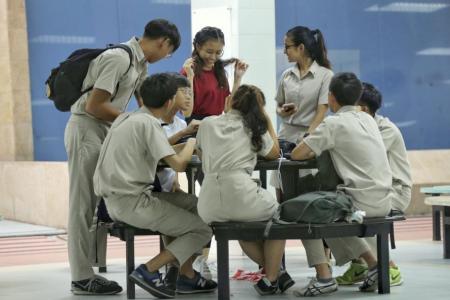8 junior colleges among 28 schools to merge in 2019
Serangoon, Tampines, Innova and Jurong JCs to move into Anderson, Meridian, Yishun and Pioneer, respectively
Hit by falling birth rates, 14 pairs of schools will merge in 2019.
And for the first time, four pairs of junior colleges (JC) are in the mix.
Serangoon, Tampines, Innova and Jurong JCs will move into Anderson, Meridian, Yishun and Pioneer respectively, the Ministry of Education (MOE) said yesterday.
To ensure minimal disruption, the JCs that are moving will stop taking in students from next year.
The names of the four merged JCs have not been confirmed, said MOE.
In what is the largest merger exercise of the past two decades, seven pairs of primary schools and three pairs of secondary schools will also merge in the same year.
The decision to merge JCs is one which MOE has agonised over, said its director of schools, Ms Liew Wei Li.
"We find that we have little choice but to merge the JCs, in order that we can provide that kind of opportunities and range of choices for the students to come," she said yesterday.

The numbers tell the story.
Since the late 1980s, Singapore's birth rate has dropped by 20 per cent. The JC intake is expected to dip as well, from about 16,000 in 2010 to 12,800 in 2019.
Said Ms Liew: "The main drop will be from next year onwards, so that's why we will need to do something.
"Otherwise, some of our JCs will have lower enrolment of about 200, 300.
"And that's quite difficult to enjoy a vibrant JC environment that many of us have experienced."
But National University of Singapore sociologist Dr Vincent Chua felt differently.
"I wonder if it is a missed opportunity for smaller enrolments, which could mean more focused teacher-student mentoring in the schools slated for merging," he told The New Paper.
LOCATION
Besides falling enrolment, the schools to be merged were picked based on other factors, such as location.
For JCs, accessibility and quality of infrastructure were also considered.
Innova JC, for instance, will move to Yishun JC despite having a newer campus because the latter is more accessible, said MOE.
As for opening Eunoia JC this year in the face of dwindling enrolment, the ministry said that rather than to increase capacity, the school's Integrated Programme gives students more options.
The JC route, however, remains relevant, with the proportion of eligible students choosing JCs as their first choice remaining stable in the last five years, said MOE.
It gave the assurance that every eligible student will have a spot even with fewer JCs after the mergers, said MOE.
There will also be no retrenchments, with teachers either posted to the merged schools, or redeployed to other schools or MOE.
Teachers who move across levels will go through bridging courses to equip them with the pedagogical skills and content knowledge to teach at their new schools.
While MOE has promised to ensure smooth transition for affected staff and students, Innova JC's principal, Mr Michael de Silva, said the biggest challenge is to explain the reasons behind the move.
"I think change is never easy for students and staff both in the past and present in a school setting," he said.
"They've had many experiences and emotional attachments through the college...
"My role now is to explain the need for the change and to deal with both the emotions and thinking of students and staff."
- ADDITIONAL REPORTING BY CHARMAINE SOH & RENI CHNG
Get The New Paper on your phone with the free TNP app. Download from the Apple App Store or Google Play Store now



